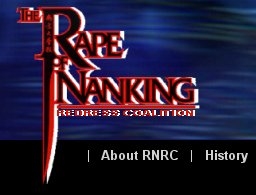|
About RNRC
-
Background
According to the 2000 U.S. census,
the population of Americans of Asian decent reached 11.6 million or
4.1%, a majority of whom were born and raised in countries throughout
East and Southeast Asia. Most of them still carry vivid and painful
memories, scars and deep wounds of the Pacific War, 1937-1945.
This historic animosity still
defines relationships within the
larger Asian American community today where some Filipino American
families will not patronize Japanese American businesses, some Korean
Americans will not buy Japanese cars, and some Chinese American
parents will not permit their children to date or marry Americans of
Japanese descent. Therefore were the Japanese Government to issue an
unequivocal apology and make due reparations, it will not only build a
genuine foundation for trust between Japan and its neighbors but will
usher in a new era of healing among the Asian American communities in
this country.
Unfortunately the Japanese Government has, to date, steadfastly denied
its war-time responsibilities although publicly maintaining it has
issued repeated apologies. To substantiate its claim, the government
cites the apology offered by Prime Minister Murayama in 1995,
conveniently forgetting that after offering the apology, Prime
Minister Murayama failed to obtain support in the Diet for an official
apology by a margin of almost 2 to1. In the meantime a national
campaign organized by a former Education minister gathered 4.5 million
signatures against Murayama‚s resolution. Therefore, while it is true
that apologies have been offered, they are personal in nature and
remain inadequate as a substitute for a formal and unequivocal
national apology.
As to demands for reparation, the Japanese government invariably
proclaims the fulfillment of its obligations by referring to the San
Francisco Peace Treaty and other international agreements. It ignores
the fact that these treaties are primarily political documents
formulated to resolve issues between governments. They neither absolve
Japan of its moral responsibility nor extinguish individual claims
brought by victims of its atrocities around the world.
Instead of heeding the example set by postwar Germany, Japan has been
stonewalling legitimate demands for apology and reparation, while it
escalates its efforts to whitewash or bury this chapter of history and
to encourage collective amnesia in Japan. Japan‚s unconscionable
stonewalling has united Asian Americans including Japanese Americans
in a redress movement to call for accountability from Japan. This
movement is informed and inspired by the successful Japanese American
struggle for a national apology and reparation from the U.S.
government that resulted in the passage of the Civil
Liberties Act of 1988.
To Asian Americans, the horror of the Pacific War is best symbolized
by a single episode, the "Rape of Nanking (Nanjing)" in 1937, when
some 300,000 Chinese men, women and children in the then capital city
of China were indiscriminately tortured, raped, and slaughtered in a
six-week orgy unleashed by the advancing Japanese Imperial Army. Thus
Asian Americans who founded an organization dedicated to bringing
about appropriate and timely redress from the Japanese Government
called it the "Rape of Nanking" Redress Coalition (RNRC). The RNRC is
an inclusive, non-profit, tax-exempt community-based organization.
The primary purpose of the international conference is to document and
educate the international community of the need for the Japanese
government to end its fifty years of denial of what happened during
the war and to accept its full responsibilities to the victims and
victimized.
|
|



